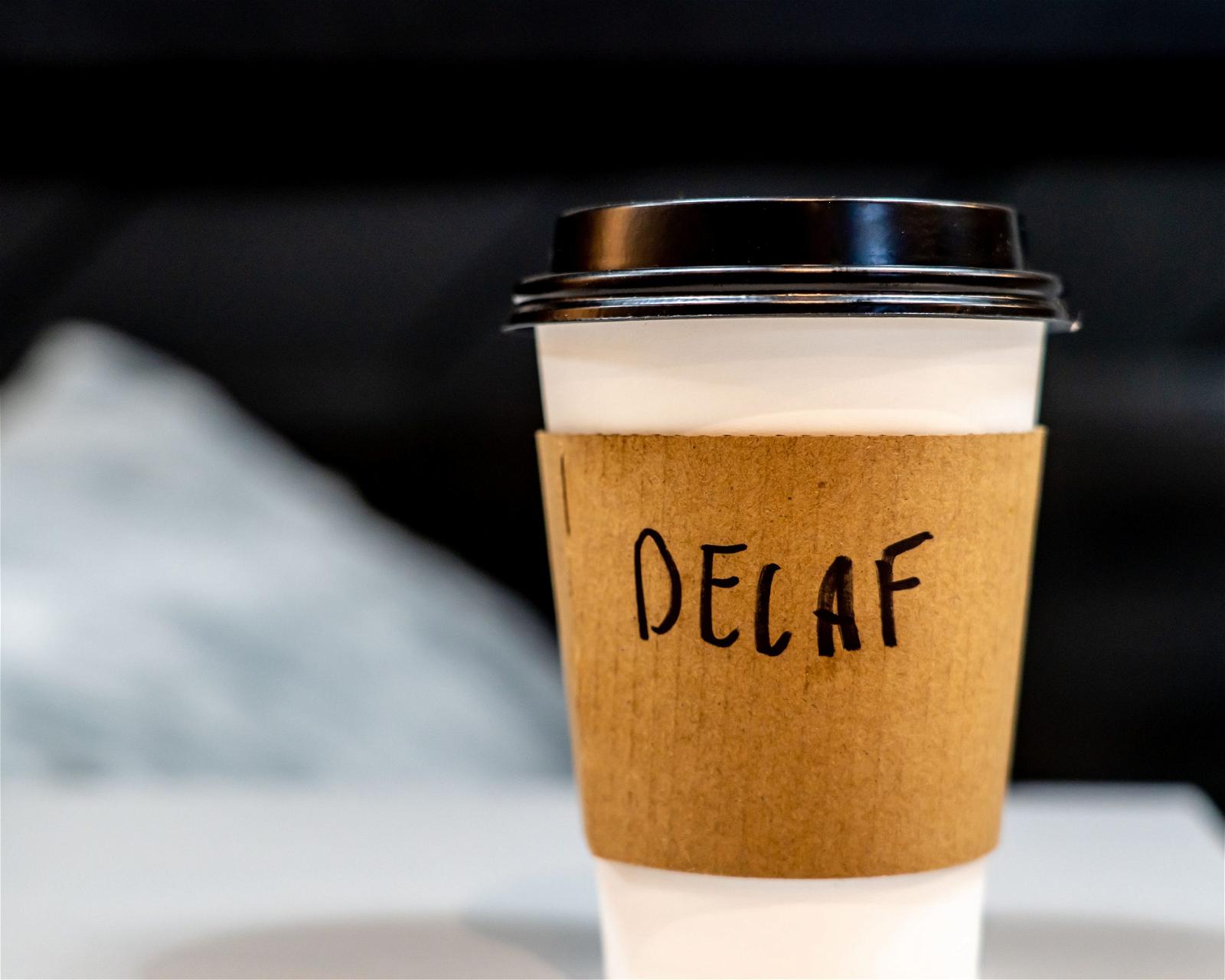How much caffeine is in decaf coffee, the processes of decaffeination, and the health benefits of decaf coffee are explained for your knowledge and benefit.

If you’re a coffee lover but are looking for a way to cut back on caffeine, decaf coffee may be the perfect choice for you. Decaf coffee is coffee that has had most of its caffeine removed, leaving only trace amounts behind.
But just how much caffeine is in decaf coffee, and is it really enough to make a difference? In this article, we’ll explore the truth about decaf coffee and caffeine content. Here is a quick answer:
| Type of Decaf Coffee | Caffeine Content |
|---|---|
| Swiss Water Process | 0-7 mg per 8 oz. |
| Direct Method | 2-5 mg per 8 oz. |
| Indirect Method | 3-4 mg per 8 oz. |
You may also like: Does Coffee Ice Creams Contain Caffeine?
What Is Caffeine?
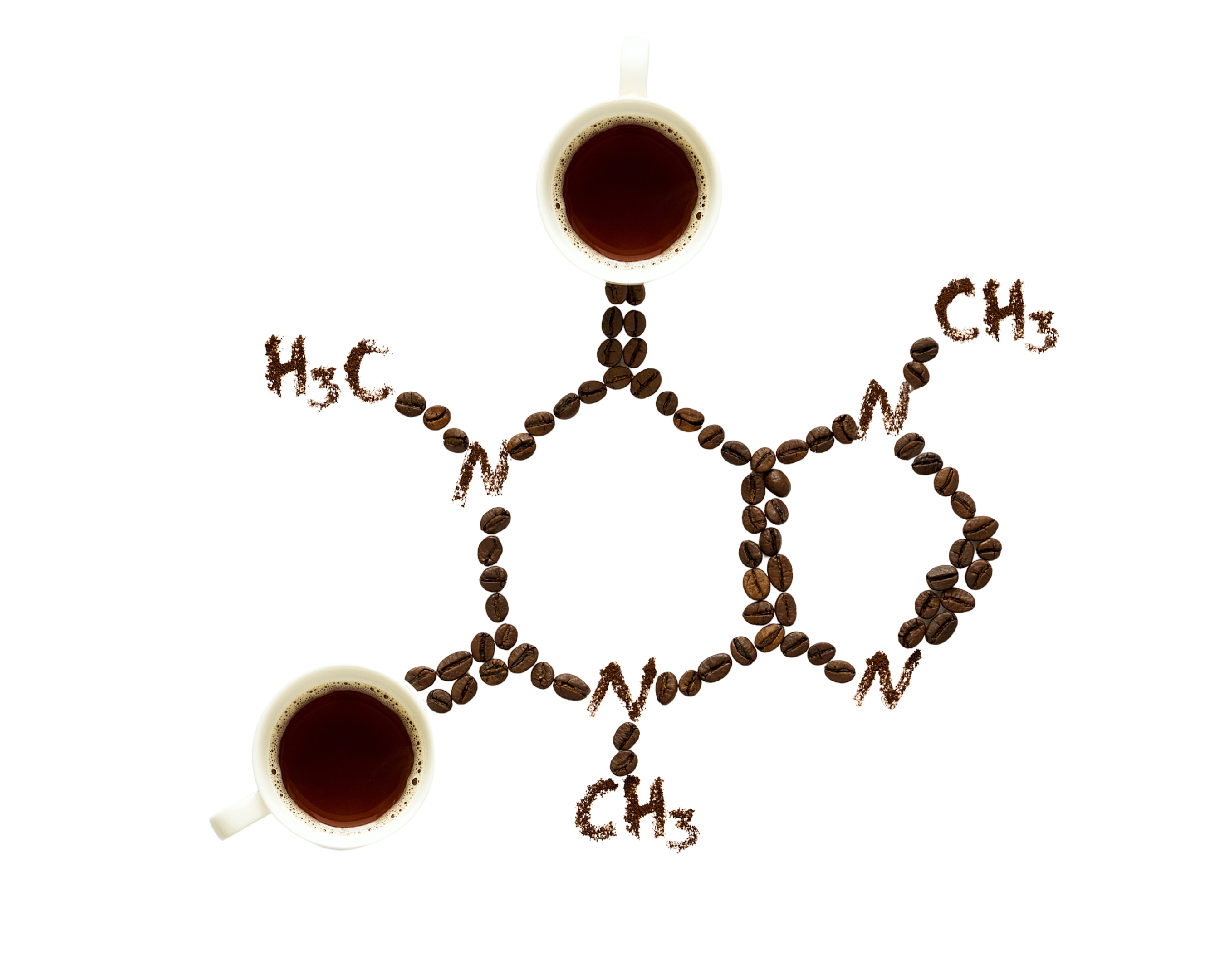
Caffeine is a bitter component and a natural stimulant found in coffee, tea, cacao pods from which chocolate products are made, kola nuts that are used for flavoring cola drinks, and in more than 60 other products.
The caffeine in these products acts as a mild stimulant, giving us a boost of energy by acting on our brain and the central nervous system and making us more alert.
It also stimulates our blood pressure control centers, heart, and muscles.
When caffeine is ingested, it travels to our bloodstream from the gut.
As its main effect is on the brain, let’s look at how caffeine makes us more alert.
We have neurotransmitters called adenosine that relax our brains. Over the course of a day, the adenosine level rises and makes us tired by the end of the day.
To counter this effect, caffeine connects with the adenosine receptors in our brain and stops them from getting activated. As a result, we feel less tired and more active.
Caffeine tends to have a quick effect on our system. The caffeine content in a cup of coffee takes about 20 minutes to reach the bloodstream and an hour to be completely effective.
What is Decaf Coffee?
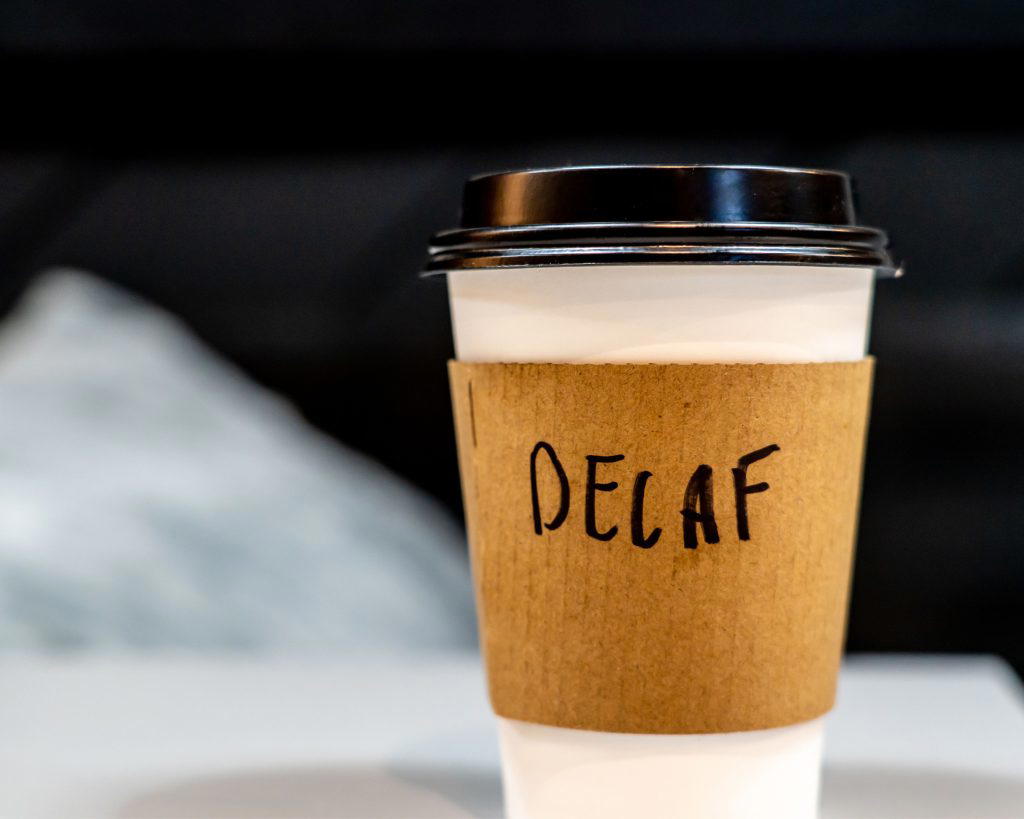
Decaf or decaffeinated coffee is coffee from which 95 – 97% of the caffeine has been removed through an extraction process.
Why is coffee decaffeinated?
Some people react negatively to regular coffee that contains 100% caffeine.
Such reactions include anxiety, jitteriness, increased blood pressure and heart rate, headaches, insomnia, etc.
That’s why caffeine is removed from coffee to give the same taste and flavor to those who are caffeine-sensitive without the unpleasant side effects of caffeine.
How is Decaf Coffee Made?
There are various methods for removing caffeine from coffee beans, each with advantages and disadvantages. The Swiss Water Process, Direct Method, Indirect Method, and Carbon Dioxide Method are the most commonly used methods.
The Swiss Water Process
The Swiss Water Process is an environmentally friendly method of decaffeination that uses water to extract caffeine from coffee beans. This method uses a mixture of hot water and activated charcoal to remove caffeine. The process takes several hours and requires special equipment. The resulting decaf coffee is chemical-free and has a rich flavor.
The Direct Method
The Direct Method is a chemical-based process that uses a solvent to extract caffeine from coffee beans. This method uses chemicals like methylene chloride or ethyl acetate to remove caffeine. The coffee beans are soaked in the solvent, which dissolves the caffeine. The caffeine is then removed, leaving behind decaf coffee. The Direct Method is faster and less expensive than other methods but leaves a small amount of chemicals in the decaf coffee.
The Indirect Method
The Indirect Method is a chemical-based process that uses water and a solvent to extract caffeine from coffee beans. This method is similar to the Direct Method, but it uses water to dissolve the caffeine from the beans. The water is then separated from the caffeine and mixed with a solvent to extract the caffeine. The solvent is then removed, leaving behind decaf coffee. The Indirect Method is more time-consuming and expensive than the Direct Method but leaves a smaller amount of chemicals in the decaf coffee.
The Carbon Dioxide Method
The Carbon Dioxide Method is a newer method of decaffeination that uses carbon dioxide to extract caffeine from coffee beans. This method uses carbon dioxide at high pressure and temperature to dissolve the caffeine. The caffeine is then removed, leaving behind decaf coffee. The Carbon Dioxide Method is more expensive than other methods but leaves no chemicals in the decaf coffee.
How Much Caffeine Is In Decaf Coffee Vs Regular Coffee?
An 8-ounce cup of decaf coffee contains up to 7 mg of caffeine whereas caffeinated coffee of the same size contains 70 – 140 mg of caffeine or at least 10X more.
| Decaf Coffee (8 oz) | Regular Coffee (8 oz) |
| 2-7 mg caffeine | 70-140 mg caffeine |
In other words, 1 to 2 cups of regular coffee have as much caffeine as 5 to 10 cups of decaf coffees.
So, for those who are trying to cut down on caffeine or coffee consumption for various reasons, caution should be exercised so as not to overconsume decaf coffee just because it’s decaf.
| Coffee Beverages | Size in Ounce (ml) | Caffeine (mg) |
| Brewed | 8 (237) | 96 |
| Brewed, decaf | 8 (237) | 2-7 |
| Espresso | 1 (30) | 64 |
| Espresso, decaf | 1 (30) | 0 |
| Instant | 8 (237) | 62 |
| Instant, decaf | 8 (237) | 2 |
As can be seen from the above table, brewed decaf may have up to 5 mg caffeine more than brewed black decaf tea and regular black or green tea has a much higher caffeine content than decaf coffee.
Did you know that even tea has caffeine? If you’re wondering about the caffeine content in decaf coffee versus tea, well, here’s a summary of what we found out.
| Tea Beverages | Size in Ounce (ml) | Caffeine (mg) |
| Brewed black | 8 (237) | 47 |
| Brewed black, decaf | 8 (237) | 2 |
| Brewed green | 8 (237) | 28 |
| Bottled, ready-to-drink | 8 (237) | 19 |
Note: Daily caffeine intake of up to 400 mg is safe for most people. This translates to 4 cups of regular coffee or 57 cups of decaffeinated coffee.
Decaf coffee brands and their caffeine content
| Decaf Coffee Brand | Caffeine Content |
|---|---|
| Dunkin’ Decaf | 8 mg per 8 oz |
| Folgers Decaf | 2-4 mg per 6 oz |
| Starbucks Decaf | 8-14 mg per 8 oz |
| Peet’s Decaf | 8-14 mg per 8 oz |
| Eight O’Clock Decaf | 2-4 mg per 6 oz |
Factors That Impact Caffeine Level in Decaf Coffee
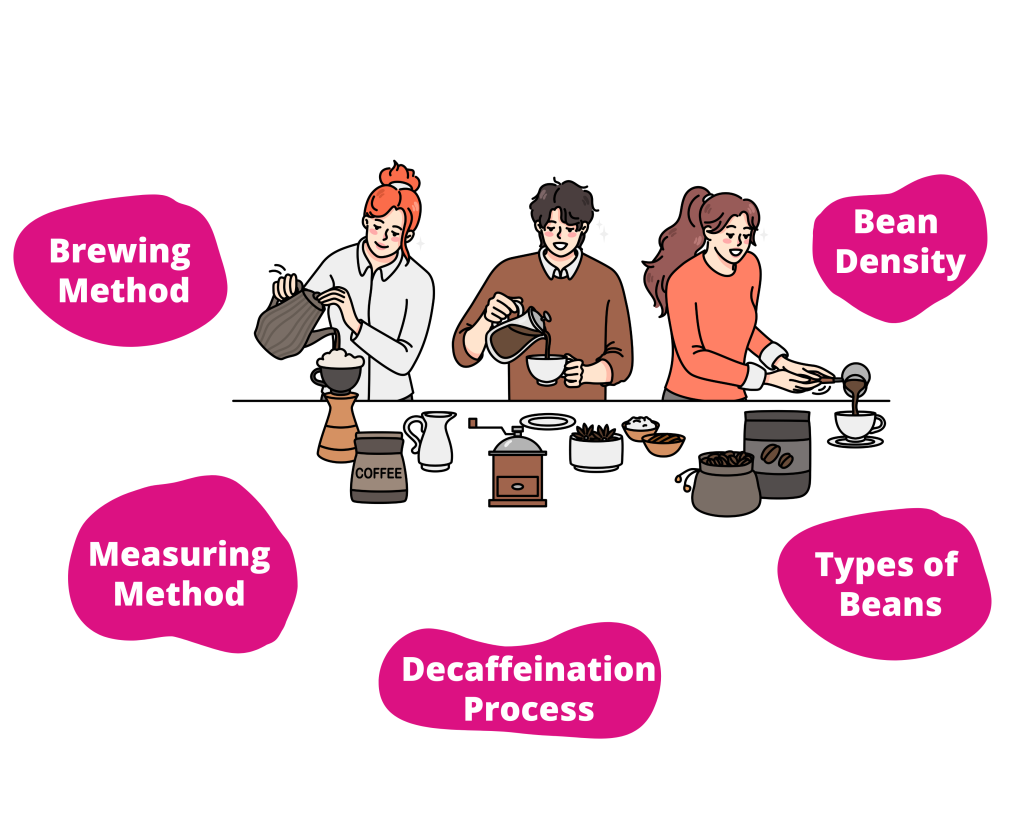
The caffeine content in decaf coffee depends on the decaffeination process, the type of coffee beans processed, the density of the beans, how you weigh them, and the brewing method.
01. Decaffeination Process
With the Swiss water process (discussed in the next section), decaffeination takes place by 99.9%.
02. Types of Beans
Two types of beans are used to make coffee – Robusta and Arabica.
Robusta is more bitter with twice the amount of caffeine than that found in the sweeter Arabica beans.
Therefore, Robusta decaffeinated coffee has a higher caffeine content than Arabica.
03. Bean Density
The density of coffee changes when it’s roasted. With longer roasting time, the coffee becomes lighter, larger, and darker.
04. Measuring by Volume Versus Weight
If you measure roasted coffee beans by volume using a coffee scoop, you’ll need more coffee if it’s a light roasted one. Light roast coffee is dense and small and you need more of these to fill a scoop.
On the other hand, using dark roast coffee means you’re choosing lighter and larger coffee. This will result in fewer beans in your coffee scoop.
Thus, a lighter roast will have more caffeine than a dark roast type of coffee because you had more of the lightly roasted beans in the scoop.
If you’re using a weighing scale, then you’ll need more of the dark roast type of coffee to reach the desired weight as these are lighter and larger. Therefore, your coffee will have more caffeine from dark roast coffee.
05. Brewing Method
Lastly, the way you brew your coffee also has an impact on the caffeine level.
A higher brewing time results in coffee with a higher caffeine level. For example, cold brew coffee has the highest caffeine level; 212 mg of caffeine per 8 ounces of coffee.
Espresso has the least amount of caffeine; 47 – 64 mg per 1 ounce of coffee.
Regular coffee caffeine level lies in between a cold brew and an espresso.
How Is Coffee Decaffeinated?
The decaffeination process is an important one because the wrong method can remove more than just caffeine – natural compounds that give coffee its unique flavor, sweet taste, and body.
Coffee is decaffeinated in three ways.
01. Swiss Water Process
The only organic way to make decaf coffee, the Swiss water process soaks the coffee beans in water.
The caffeine and other flavor compounds from the unroasted beans get dissolved in the water.
Through a filter, this water is passed to trap the caffeine but not the natural oils and the flavor compounds.
The coffee beans are then soaked in filtered water to absorb all the natural flavor and oils.
A similar process to Swiss water is the mountain water decaf process.
02. Solvent-Based Process
In the solvent-based process, also known as the sugar cane method, a solution of water, ethyl acetate, and methylene chloride is used to extract caffeine from unroasted coffee beans.
These chemical compounds are not found in decaf coffee as they evaporate during the decaffeination process.
03. Carbon Dioxide Process
The most expensive but efficient method of decaffeination is the carbon dioxide process.
Carbon dioxide is naturally found in coffee and is used to extract the caffeine and leave the other compounds as they are in the coffee.
Is Decaf Coffee For Me?
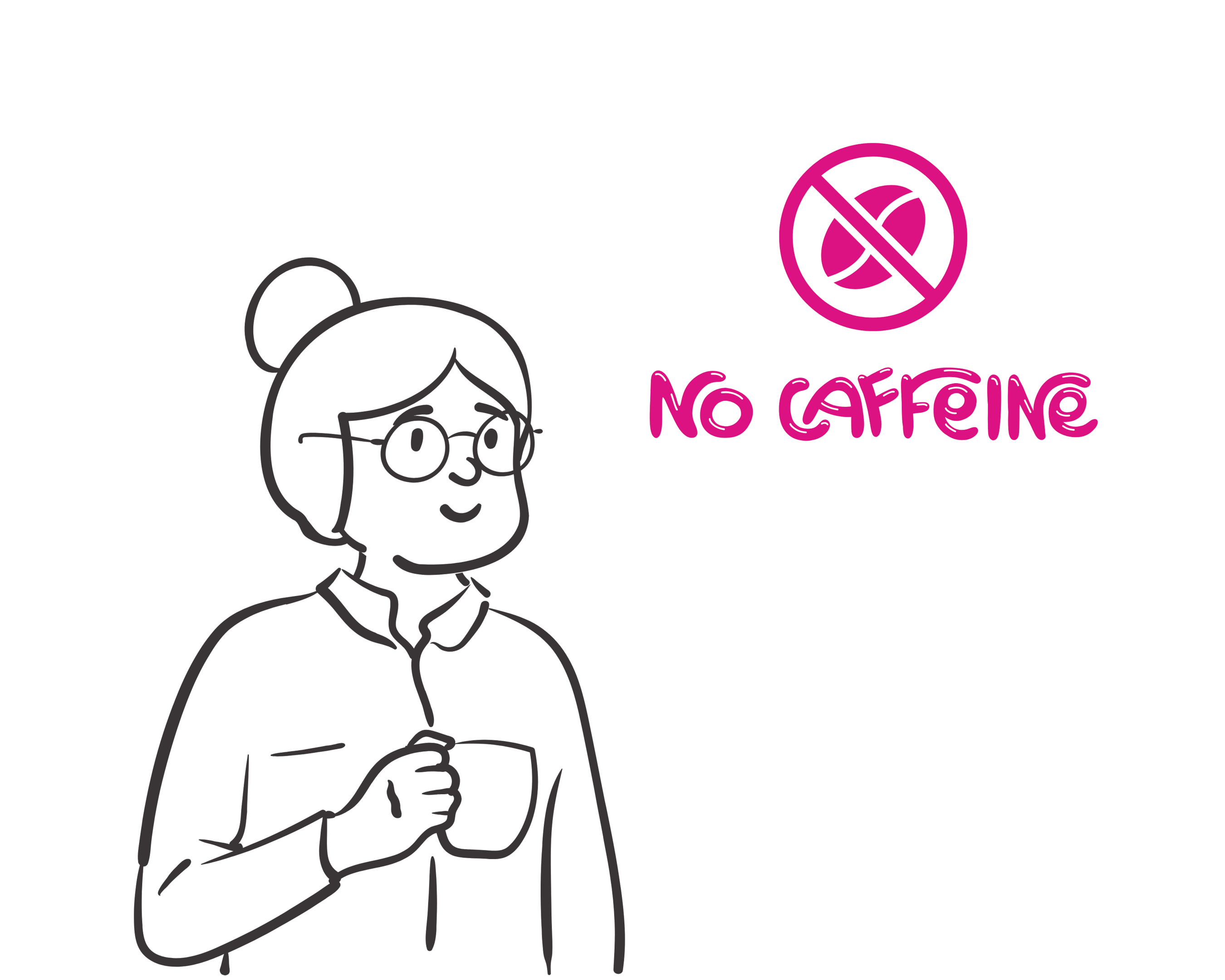
If you need to curtail caffeine intake owing to one or more of the following conditions, then decaf coffee is better for you.
1️⃣ Heartburn or GERD (gastroesophageal reflux disease)
2️⃣ Increased heart rate or blood pressure
3️⃣ Nausea
4️⃣ Anxiety
5️⃣ Jitteriness
6️⃣ Insomnia
7️⃣ Headaches
8️⃣ Irritability
9️⃣ Breastfeeding or pregnant
🔟 Current medications like antidepressants or antibiotics react with caffeine
Choose dark roast decaf coffee beans like this one with a lower caffeine and acid level.
Does Decaf Coffee Have Health Benefits?
Most research conducted so far has been on users who take either regular or decaf coffee, without specifying decaf in particular. Therefore, it’s hard to pinpoint any health benefits provided solely by drinking decaf coffee although both types contain a lot of antioxidants.
Regular coffee and decaf coffee have been associated with the following health benefits without conclusive evidence that these were the results of drinking coffee.
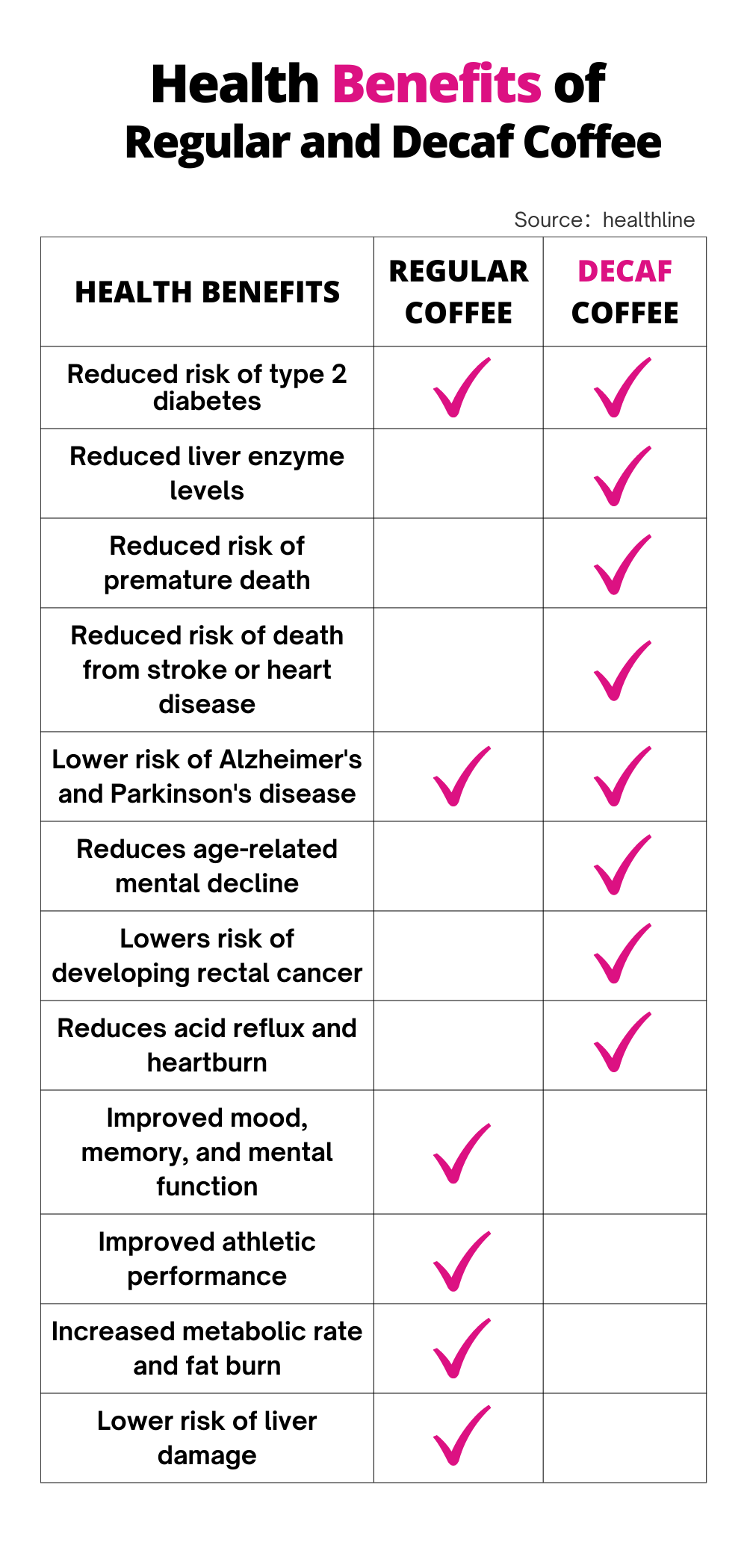
How Much Caffeine Is In Decaf Coffee: Starbucks, Dunkin’ Donuts, And Other Chains
It’s natural to grab a cup of coffee from Starbucks, Dunkin’ Donuts, or any of the other local chains on your way to work.
If you are a regular decaf coffee drinker, then it pays to know the caffeine content in the decaffeinated coffee from these chains.
| Coffee | 10-12 oz (295-354 ml) | 14-16 oz (414-473 ml) | 20-24 oz (591-709 ml) |
| Starbucks Pike’s Place Roast | 20 mg | 25 mg | 30 mg |
| Dunkin’s Donuts | 7 mg | 10 mg | 15 mg |
| McDonald’s | 8 mg | 11 mg | 14-18 mg |
| Average decaf rewed coffee | 7-8.4 mg | 9.8-11.2 mg | 14-16.8 mg |
| Average decaf instant coffee | 3.1-3.8 mg | 4.4-5 mg | 6.3-7.5 mg |
Knowing exactly your caffeine consumption will keep your caffeine intake within the safe limit of 400 mg per day.
Plus, if you’re a regular decaf coffee drinker, it’s good to know which chain to get your decaf cup from next time.
The Bottom Line
All said and done, both regular coffee and decaf coffee have health benefits for you.
As long as you’re not exceeding the 400 mg caffeine level per day, you should be okay with having regular coffee.
But if you have certain medical conditions or are pregnant or taking medications that react with caffeine or if you have caffeine sensitivity, it’s better to settle for a good caffeine-free coffee for regular consumption.
FAQs
Is Decaf Worse Than Caffeine?
Decaf is not worse than caffeine for those who are caffeine-sensitive.
In some people, caffeine causes increased heart rate, jitteriness, anxiety, headaches, insomnia, and other health conditions.
Decaf is better for them as it has the benefits of regular coffee without the side effects of caffeine.
Is Decaf 100% No Caffeine?
No, decaf is not 100% caffeine free. Decaffeination removes 97% of the caffeine from coffee. So, you’re still left with 7 mg of caffeine in an 8-ounce cup.
Can You Feel Caffeine Content In Decaf Coffee?
Decaf coffee is similar in taste and appearance to regular coffee so it’s not likely that you will feel the tiny percentage of caffeine in decaf coffee.
How Much Caffeine Is In Decaf Coffee K Cups?
A K Cup Decaf 8-ounce cup contains 4 mg of caffeine.
